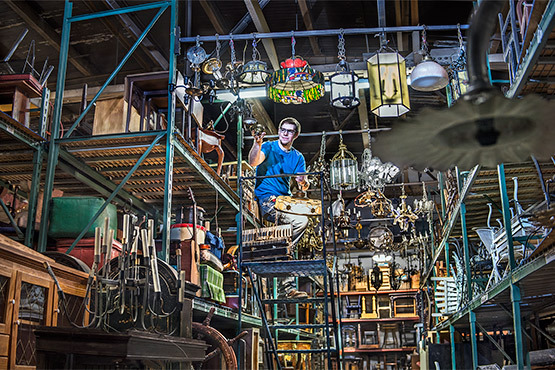
News . Feature Stories . Creativity behind the scenes and on the fly
News
March 29, 2016
Creativity behind the scenes and on the fly
CIA grad Davis puts skills in action as theater apprentice

In the props storage room at Cleveland Play House, apprentice Jarrod Davis cares for and sometimes adds to the collection.
By Karen Sandstrom
On a visit to the Cleveland Play House’s props department, you’d be hard pressed to find a better tour guide than Jarrod Davis. Tall, easygoing and friendly, Davis oozes enthusiasm for what gets built and stored in the theater’s production facility off E. 72nd Street in Cleveland. He seems to take pleasure from a visitor’s wide-eyed discovery of the massive collection of old objects waiting for a casting call.
Davis, a 2015 graduate of the Cleveland Institute of Art, is finishing a yearlong apprenticeship at Cleveland Play House, where he has been making, fixing and caring for props. The gig has him working alongside the pros who build sets and paint scenery. He loves the whole scene, but especially the part that provides an opportunity to study old machines.
The theater recently received an antique dentist chair for its props collection, and the hydraulic pump didn’t work. “We had to figure out how to put oil in this ancient dentist chair,” Davis says. “I like tinkering with old machines like that.”
Figuring it out has been the essence of Davis’s apprenticeship. The job description didn’t say jack-of-all-trades, but that’s what the work is — and what Davis naturally does anyway.
He shows off a faux motorcycle he built for a scene in “Two Gentlemen of Verona.” He ambles through the rows of floor-to-rafters shelves of chairs, sofas, fake flowers, old fans. There’s a section for telephones, and a strangely compelling wall of old umbrellas.
Davis majored in what CIA now calls Sculpture + Expanded Media, where he incorporated video, interactive web, photography and animation techniques, while exploring sculpture and metals.
He also had a short stint working as an assistant to Jimmy Kuehnle, a faculty member in Foundation, whose sculptural pieces have included custom fabricated bicycles. Davis loved the experience, he says, and the job gave him some groundwork to build on when bosses at the theater asked him to make three stage motorcycles for “Two Gentlemen of Verona.”
He helped his boss make two chandeliers for a production of “A Comedy of Tenors” (“there were so many pieces of Plexiglas for the shades of those chandeliers,” he says) and he built and upholstered a pair of ottomans for scenes in Martin Luther King Jr.’s hotel room in the play “The Mountaintop.”
“Jarrod is a prime example of an apprentice who demonstrated his advanced skill-set to his supervisor almost immediately,” says Allen O’Reilly, the education programs manager at the theater. The company hires 15 apprentices in all disciplines, from marketing to scene making.
Growing up in the Portage County, Ohio town of Windham, Davis came by some of his skills naturally. His extended family had a dairy farm. “I grew up in this land with all this old farm equipment and all my uncles around, and I remember them — especially my father — fixing things,” he says.
Art wasn’t a common career path in rural Windham, and when Davis arrived for his Foundation year at CIA, “I was a fish out of water.” His face tightens as he remembers stumbling through his first drawing class with Drawing chair Sarah Kabot.
“She knew I didn’t know anything,” he says. “But that was a beautiful thing to have that Foundation year. Without that, what was I going to do?”
And even growing up in that rural environment, where family members tinkered and fixed things on their own, didn’t fully prepare him for learning to fabricate.
“I didn’t know anything about a wood shop or a metal shop,” Davis says. But at CIA, he held work-study positions in the woodshop, where Bill Leddy and Jerry Birchfield Sr. (now retired) used to instruct newbies on the wonders and perils of the circular saw. “There’s no way I would have gotten that without the institute.”
Davis’s education continues. His work at the theater brings new challenges, such as during tech week — the period before a play starts, when rehearsals focus on buttoning down details. If a prop or lights need to be fixed, it probably has to happen on site, with less elaborate gear than the production center is equipped with. The most valuable skill at that point is improvisation — or, as Davis says, “How do you solve this with bumble gum and duct tape?”
He also has learned how to work under a drop-dead deadline. “If the play starts on Friday, it starts on Friday,” he says. “If you don’t fulfill your requirement, you’ve lost.”
Finally, the experience has reinforced what it means to be part of a team.
“At the institute, I was making art to my own tolerances, so if I like it: boom,” he says. “Here, some of my projects have to work with the designer’s predetermined measurements, and I can’t wane from that. It’s that, or it’s bad. You have a client and you need to do it.”
Latest Headlines view all
-
April 02, 2024
Cleveland Institute of Art students partner with Progressive Art Collection to exhibit Ready, Set, Relay! -
March 04, 2024
Cleveland Institute of Art announces Curlee Raven Holton Inclusion Scholar Program -
November 06, 2023
Collision of art and artificial intelligence creates murky waters for artists, curators and educators
Questions?
For more information about this or other CIA news, contact us here.
Social Feed